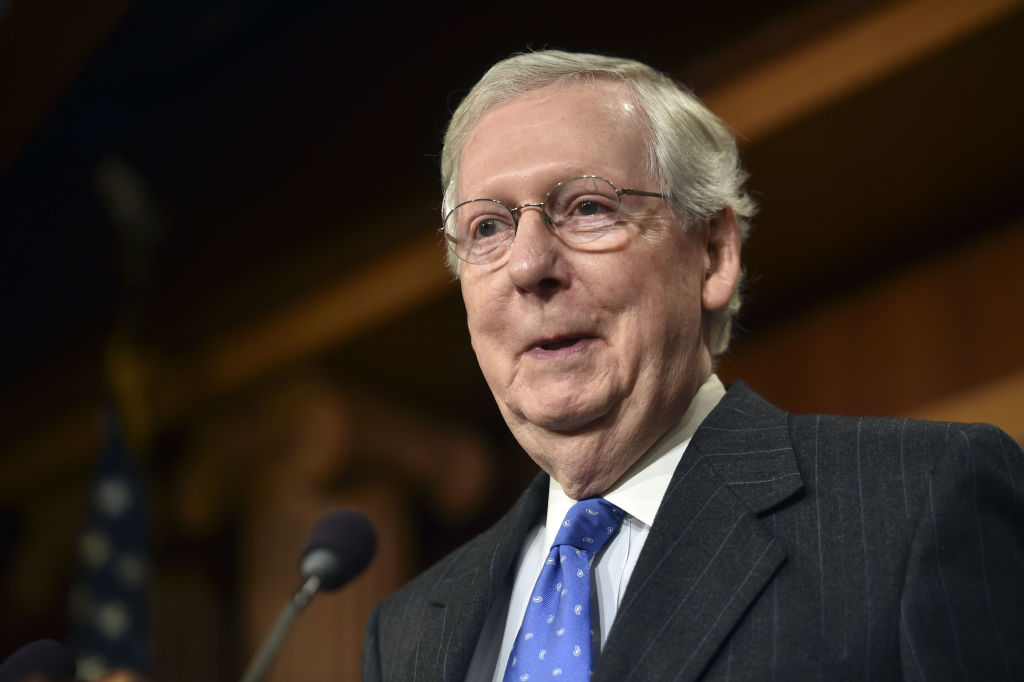
Senate Majority Leader Mitch McConnell has always been straightforward about his playbook, and his admission earlier this week that he would fill a Supreme Court vacancy with a Trump nominee if it became open before the election is just the latest display of the lengths he’s willing to go to advance Republican interests.
On Tuesday he made headlines in Paducah, Kentucky when a man asked him at a luncheon in his home state what would happen in the hypothetical scenario that a seat became open. McConnell took a sip of sweet tea, then smiled and said, “Oh, we’d fill it,” drawing laughter from the audience. The remark fit a broader pattern for McConnell of being fairly blunt about the typical partisan knife-fighting
For many Democrats, that answer was maddening, given that McConnell blocked Obama nominee Merrick Garland — leaving a seat open on the nine-member court for a record-setting 422 days — on the argument that the 2016 election should decide who would fill the seat.
One Democratic aide on Capitol Hill called it “hypocritical,” arguing that McConnell was being transparently partisan.
“For some reason I continue to be disgusted by his political plays that are way beyond ‘playing hardball,’ by the way, and surprised when I should know better,” the aide told TIME.
But it was not as surprising as it might seem. The majority leader’s aides sent an email to reporters Wednesday morning pointing out that McConnell has consistently said since 2016 that a Supreme Court nominee has not been confirmed by a Senate controlled by the opposite party since the 19th century.
“If there is a vacancy next year, because the White House and the Senate are the same party, we would vote to fill the slot,” David Popp, a spokesman for the majority leader, said in the email.
McConnell allies noted that while his answer might have upset Democrats, it was consistent.
“He was very careful and precise in his language,” said Michael Steel, a former aide to former House Speaker John Boehner, about McConnell’s Tuesday remarks. “I think he may have been more direct in his response because he was home in Kentucky rather than addressing the Senate floor, but that doesn’t change his position.”
It’s far from the first time McConnell has simply opted to be upfront about his position.
In 2010, McConnell famously said that the most important thing Republicans wanted to achieve was to make Obama a one-term president.
And in 2011, he told The Atlantic that Republicans deliberately “worked to keep our fingerprints” off of Democratic proposals in order to make it easier to campaign against them.
“We thought — correctly, I think — that the only way the American people would know that a great debate was going on was if the measures were not bipartisan,” McConnell. “When you hang the ‘bipartisan’ tag on something, the perception is that differences have been worked out, and there’s a broad agreement that that’s the way forward.”
“I think he’s been pretty resolute in his position on this subject,” said a Republican strategist about McConnell on the subject of the Supreme Court. “He’s just being forthright with his intentions as Senate majority leader.”
The strategist pointed to an instance when McConnell, asked at a press conference why he wasn’t bringing forward a piece of legislation, answered simply with a smile: “Because I get to decide what we vote on.”
Correction, May 30:
The original version of this story misstated the last time a Supreme Court nominee was confirmed by a Senate controlled by the opposing party. It was the 19th century, not the 18th.
More Must-Reads from TIME
- Introducing the 2024 TIME100 Next
- The Reinvention of J.D. Vance
- How to Survive Election Season Without Losing Your Mind
- Welcome to the Golden Age of Scams
- Did the Pandemic Break Our Brains?
- The Many Lives of Jack Antonoff
- 33 True Crime Documentaries That Shaped the Genre
- Why Gut Health Issues Are More Common in Women
Write to Lissandra Villa at lissandra.villa@time.com
